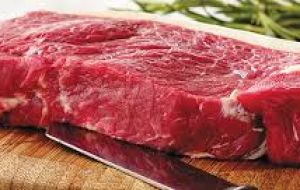MercoPress. South Atlantic News Agency
Global food commodity prices rose in June, led by wheat and meat prices.
 Prices of all dairy products that constitute the index rose, but butter price increased the most, rising 51.2 points (14.1%) from May to an all-time high.
Prices of all dairy products that constitute the index rose, but butter price increased the most, rising 51.2 points (14.1%) from May to an all-time high.  The Meat Price Index averaged 175.2 points in June, up 3.2 points (1.8%) from May, marking the sixth consecutive month of moderate price increases.
The Meat Price Index averaged 175.2 points in June, up 3.2 points (1.8%) from May, marking the sixth consecutive month of moderate price increases.  Limited export supplies in Oceania, coupled with strong buying interest, underpinned bovine and ovine meat prices
Limited export supplies in Oceania, coupled with strong buying interest, underpinned bovine and ovine meat prices The FAO monthly Food Price Index averaged 175.2 points in June, up 1.4% from May and 7.0% from a year earlier. The FAO Cereal Price Index rose by 4.2% in the month, amid surging prices of high-protein wheat due to deteriorating crop conditions in the United States of America. Maize prices, by contrast, declined amid record harvests in South America.
FAO's price indices for meat and dairy products also rose, while those for vegetable oils and sugar dropped.
The FAO Cereal Price Index averaged 154.3 points in June, 6.2 points (4.2 percent) above its May level and representing a one-year high. Wheat quotations increased the most, largely reflecting a surge in high-protein wheat values due to deteriorating crop conditions in the United States, while strong import demand exerted upward pressure on international rice prices. By contrast, record harvests in South America kept maize prices under downward pressure.
The FAO Vegetable Oil Price Index averaged 162.1 points in June, down 6.5 points (or 3.9 percent) from May, when prices experienced a short-lived rebound. The slide in the index mainly reflects falling palm and soy oil values. International palm oil quotations dropped by a full 7 percent (marking a 10-month low), primarily because of good production prospects in Southeast Asia. Soy oil values dropped as South American bumper harvests bolstered global availabilities, while forecasts point to a near-record global output in 2017/18. Rapeseed and sunflower oil values also dropped, contributing to the overall fall in the index.
The FAO Dairy Price Index averaged 209 points in June, up 15.9 points (8.3 percent) from May. This increase pushed the Index close to the highs registered during the last three years, although it is still 24 percent below its peak reached in February 2014. Prices of all dairy products that constitute the index rose, but butter price increased the most, rising 51.2 points (14.1 percent) from May to an all-time high. Limited export availabilities of dairy products in all major producing countries caused the prices of butter, cheese and skim milk powder to rise significantly, contributing also to stronger whole milk powder prices.
The FAO Meat Price Index* averaged 175.2 points in June, up 3.2 points (1.8 percent) from May, marking the sixth consecutive month of moderate price increases. Limited export supplies in Oceania, coupled with strong buying interest, underpinned bovine and ovine meat prices in June, while solid import demand lent some support to pig meat prices. By contrast, poultry quotations continued to be affected by concerns over the spread of Avian Influenza in Europe, Asia and Africa.
The FAO Sugar Price Index averaged 197.3 points in June, down nearly 31 points (13.4 percent) from May and marking a 16-month low. International sugar prices have fallen steadily since February, with the continued decline reflecting large export availabilities, in particular robust Brazilian supplies. Weak import demand has exerted further downward pressure on quotations, especially as purchases by the world’s leading importer, China, have slowed following the imposition of high import tariffs.




Top Comments
Disclaimer & comment rulesCommenting for this story is now closed.
If you have a Facebook account, become a fan and comment on our Facebook Page!